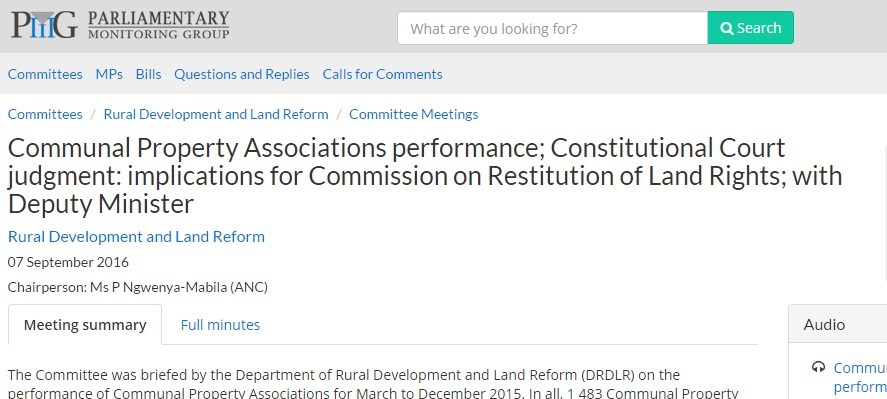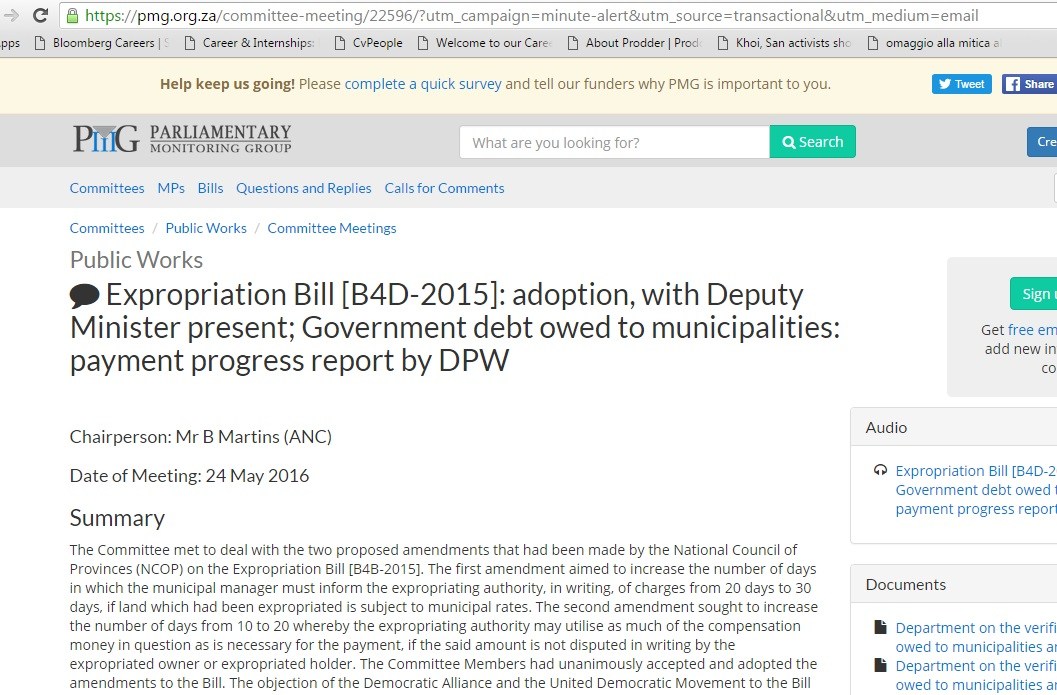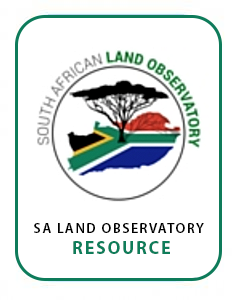Location
What is the Parliamentary Monitoring Group?
The Parliamentary Monitoring Group, an information service, was established in 1995 as a partnership between Black Sash, Human Rights Committee and Idasa with the aim of providing a type of Hansard for the proceedings of the more than fifty South African Parliamentary Committees for these three advocacy organisations. This was because there is no official record publicly available of the committee proceedings - the engine room of Parliament - and this type of information is needed by social justice organisations to lobby the Parliament of South Africa on pieces of legislation, matters of democratic processes and parliamentary oversight of the executive.
This website was set up at the beginning of 1998 to make the information generated available to a wider audience. Presently this is the only source for this type of information. We hope that the PMG committee reports and other documents will provide the public with an insight into the Parliament of South Africa and its daily activity. Importantly it provides a window into the performance of each government department and public entity over which each parliamentary committee has oversight.
PMG became a fully fledged independent NGO in July 2009.
Members:
Resources
Displaying 1 - 5 of 75Extension of security of tenure (land) Amendment Bill: stakeholders’ consultative meeting, with Deputy Minister of Labour
SALGA supports the amendments on tenure grants although it proposed that the provision of bulk services for alternative land and the delivery of municipal services should also be included in the tenure grant. SALGA supports the amendments as it affects limitations on evictions and additional rights to occupiers. The amendments on the establishment of a land rights management board and land rights management committees are also supported by SALGA. The submission discussed the challenges of evictions and the impacts of this on municipalities in detail.
Communal Property Associations performance; Constitutional Court judgment: implications for Commission on Restitution of Land Rights; with Deputy Minister
The Committee was briefed by the Department of Rural Development and Land Reform (DRDLR) on the performance of Communal Property Associations for March to December 2015. In all, 1 483 Communal Property Associations (CPAs) had been registered since the passing of the Act and 48 were registered in the 2015/16 financial year. The CPAs had been afflicted by a number of problems and the Department had taken steps to address them by the establishment of CPA District Fora to serve as a platform to share experiences.
DRDLR on its 4th quarter 2015/16 performance; Restitution of Land Rights Amendment Act Constitutional judgement: legal opinion
The Department achieved 56% of Q4 targets and 50% of Annual Performance Report targets in its Administration programme while annual targets on vacancies filled and disciplinary cases were partially achieved. In Geospatial and Cadastral Services, the Department achieved 77% of its Q4 targets and 69% of its APR targets. The Rural Development programme achieved 71% of its Q4 targets and 86% of its APR targets. The annual target for establishment of rural information desks was not achieved and the target of jobs created was partially achieved.
Expropriation Bill [B4D-2015]: adoption, with Deputy Minister present; Government debt owed to municipalities: payment progress report by DPW
The Committee met to deal with the two proposed amendments that had been made by the National Council of Provinces (NCOP) on the Expropriation Bill [B4B-2015]. The first amendment aimed to increase the number of days in which the municipal manager must inform the expropriating authority, in writing, of charges from 20 days to 30 days, if land which had been expropriated is subject to municipal rates.
Commission on Restitution of Land Rights 2nd & 3rd Quarter 2015/16 performance, with Deputy Minister
The Committee welcomed the Quarterly Reports as they showed the progress that had been made in dealing with claims. However discomfort was expressed at the pace of restitution. The Committee was very interested in the research aspect of the Commission’s brief.






